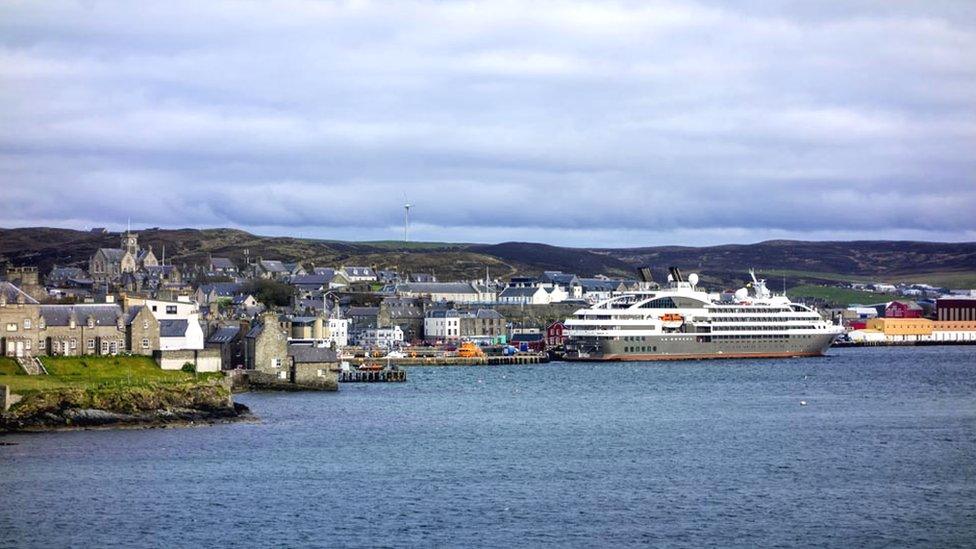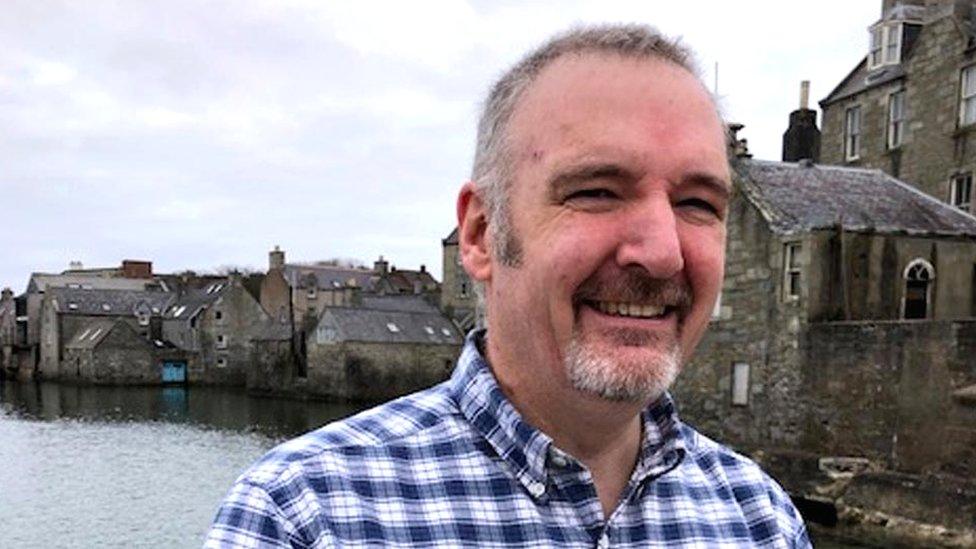Coronavirus: Call for islands to test, trace, isolate
- Published

Shetland managed to suppress an early first wave of coronavirus
A shift to contact tracing could help "snuff out" coronavirus in island communities like Shetland, one expert has claimed.
Shetland was an early hotspot for Covid-19, but suppressed the outbreak with a containment strategy.
The islands now have their own testing facilities, prompting calls to return to "test, trace and isolate".
Public health expert Prof Allyson Pollock argues that a bespoke approach could work well in island communities
The Faroe Islands, 200 miles north of Shetland, are now gradually coming out of lockdown thanks to test, trace, isolate.
The Scottish government said it welcomed views from across the country on the "complex issues ahead as we look beyond lockdown".
Figures from the weekend indicated that Shetland has 54 confirmed cases of Covid-19
Lockdown means travel by ferry or plane is barred to all but essential workers and island residents.
'Speed is key'
New testing equipment arrived last week, cutting down waiting times for results to come back from labs in Glasgow and Aberdeen from days to hours.
NHS Shetland laboratory manager Robert Wardrop explained how the testing works.
"We put the patient sample into a cartridge, it's got all the reagents we need", he said. "We put it into the machine, it churns out the result in basically an hour, and hour and 10 minutes.
"I think key for Shetland is speed, rather than waiting a day, a day-and-a-half for results we'll be getting results back within hours."
It is a relief for health care workers such as senior charge nurse Aimee Sutherland, who works in accident and emergency at the island hospital.
"If there was an outbreak anywhere you'd be able to get the results back quicker and contain that quicker as well," she said.
"Coming into work maybe thinking we're down two nurses but this will make a big impact that if we can get folk back to work the next day."

Health board chairman Gary Robinson said the testing machine offers flexibility
The ability to do testing in Shetland gives the islands the ability to move away from the current delay phase back to trying to contain the virus.
Gary Robinson, chairman of the health board, said: "The machine gives us the capacity and also the flexibility that should allow us to test much more people, but also to get back to the test, trace and isolate phase of the pandemic response.
"When the outbreak started here, differently to Orkney and the Western Isles, we actually identified our first patients and so we traced their contacts.
"That process went on up until the time that the government called a halt to test, trace and isolate."
The Faroe Islands has seen mass testing taking place as part of its strategy of coming out of lockdown.
A scientist adapted his veterinary laboratory, normally used for testing for disease in salmon, to carry out the work.

Faroe Prime Minister Barour a Steig Nielsen said society was being opened up again
Prime Minister Barour a Steig Nielsen said: "We already from the start had a strategy you must test the people and to be able to track them and quarantine the people who had been in contact with the persons that had been tested positive.
"Now we are in the second phase that we are slowly opening up the society again, we are starting up with the younger people, the younger class in the school, and the kindergartens."
'Really essential'
Prof Allyson Pollock, from Newcastle University, argues Covid-19 should not be seen as one outbreak, but as a whole series of smaller localised ones, and advocates contact tracing.
She said: "Shetland have a lot of cases at the moment, (it has 54 cases), it's much higher than some of the other islands.
"So actually contact tracing is really essential in Shetland because you want to begin make sure that everybody who has been in contact with a case is quarantined for 14 days.
"In Shetland which is a small island it's really important to snuff out that disease fast."

A SIMPLE GUIDE: How do I protect myself?
AVOIDING CONTACT: The rules on self-isolation and exercise
WHAT WE DON'T KNOW How to understand the death toll
TESTING: Can I get tested for coronavirus?
LOOK-UP TOOL: Check cases in your area

The islands, like other places, have suffered economically during the lockdown. The sun may have been out in recent days, but the streets of Lerwick are all but empty with the tourist season on hold.
Joanna Hunter runs a small knitwear business in the centre of town. She, like others, has had to adapt, until the current situation changes.
'Balanced judgments'
She said: "It's been tricky because obviously we're at the time of year where we've just bought all the stock for the tourist season and we're fully stocked up, ready to go.
"We're now moving as much as we can online and trying to just change the way we do business."
First Minister Nicola Sturgeon said last week that islands taking a different approach to lockdown was not being ruled out, but would be "balanced judgments".
The Scottish government said in a statement: "We are working very closely with Health Protection Scotland and National Services Scotland to rapidly increase our NHS laboratory capacity in Scotland.
"This has already increased to over 2,000 test capacity daily and will continue to increase to around 3,500 at the end of April. We are working to ensure that every NHS Board has capacity to do some local testing as part of this, including rural and island NHS boards."
The statement added: "We are also working urgently with the UK government to identify what options are available, through the expanded testing programme, to reach people in rural and island communities.
"How and when we can move on from the current situation will involve a consideration of the impact on all the communities in Scotland.
"As the first minister has set out in recent days, we welcome views from across the country on the complex issues ahead as we look beyond lockdown."